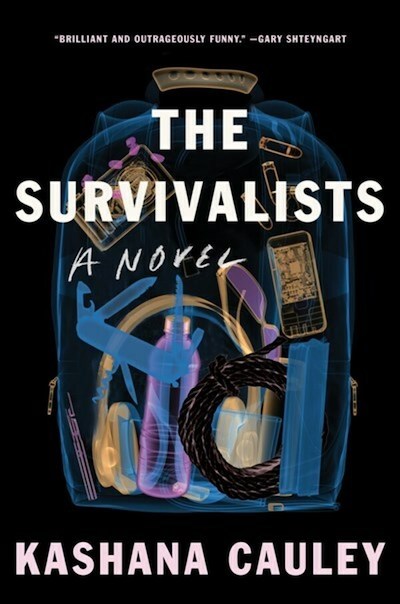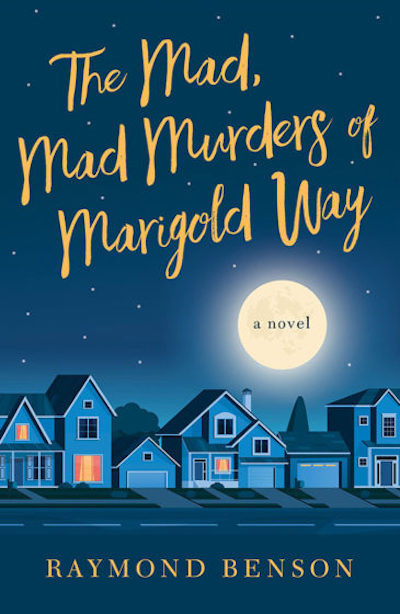A lean, wonderfully written story of a husband and wife, serial killers who target only bad men who deserve it: primarily rapists and sexual abusers. While the two couldn’t come from more dissimilar backgrounds—British Hazel has dragged herself out of a childhood of poverty and neglect and is now a successful painter, while American Fox, a finance guy, descends from one of the USA’s wealthiest, most prominent families. But it was their joint passion for murder that brought them—and keeps them—together. Until, that is, in this version of Mr. and Mrs. Smith, Hazel discovers she is pregnant, and off to the London suburbs they go. At Fox’s insistence, they agree to no more murders until baby Bibi is 21—how can they risk incarceration, which would leave Bibi an orphan? But Hazel can barely tolerate motherhood, never mind forgoing murders, and it’s thanks to her one “mom friend,” Jenny, that she is able to keep it together. Until she suspects Fox of harboring secrets, she develops a few herself, and Jenny turns out to be, of all things, a cop. The pace is just perfect, the characters alternately funny and dark, and the head-spins relentless.
Satire
It’s not every protagonist who introduces herself to readers while in the middle of getting an intimate area waxed, but Rose Aslani isn’t every protagonist. She’s the quintessential new New York Gen Zer: being worked to death in media, living with a strange roommate who seems only vaguely familiar with being clothed, and fielding suggestions from her parents like, “Why don’t you email the New York Times and ask them for a job?” All the while, Rose is nursing an obsession with the titular Most Famous Girl in the World, Poppy Hastings. A couple of years ago, Poppy’s fake-socialite scam was exposed–by Rose–and she’s just gotten out of prison for those exploits, but it’s too little for her nemesis. Rose knows that Poppy’s scamming was the tip of a criminal iceberg, and she stalks the woman, who flaunts her zany, fibbing ways to every internet hack who’ll listen. The public can’t get enough of it, while Rose is accused at work of paranoia, dropped by a succession of therapists, and falling deeper into reliance on booze and pills. Then the journalist begins to receive texts that help her in her quest to take Poppy down, a quest on which she’s aided by dishy FBI agent Simon. The story takes on some serious themes, notably Rose’s lifelong feeling of alienation as the daughter of immigrants from Iran who love her (as will readers) but “[love] the idea of passing more.” Closing with several shocking twists, this is one for women who’ve had it and fans of the true-crime wave of podcasts and documentaries about scammers.
London-based Anisa is a translator—she provides subtitles for Bollywood movies—but dreams of translating great works of literature. Her spare time is spent hanging out, talking politics, and complaining about her rather useless white boyfriend, Adam, himself a highly successful translator. In fact, on a trip with Anisa to visit her family in Karachi, Adam reveals that he’s also become fluent in Urdu, speaking it better than Anise. Anise goes into a tailspin. “This is shady as fuck.” There’s no way that Adam could become that fluent in years, never mind days. When she presses him for details, he lets her in on the Centre, where after thousands of dollars and ten days of study—living there, avoiding all contact with others, and listening only to your chosen language—you emerge completely fluent.
Skeptical but eager to give it a try, Anisa enters the Centre to learn German—and indeed, after several days of study she has a breakthrough. Along the way, she becomes close to Shiba, who manages the Centre and whose father was one of four men who, while Oxford students, developed this radical approach to language learning. But how radical is it? On a trip to New Delhi with Shiba, Anisa finally learns how the Centre works—and the discovery is shocking.This is a debut, but Siddiqi writes like a pro, slowly building the character of Anisa, so that when the big reveal is made, it’s all the more meaningful.
Ready for something completely different? This brilliantly odd and unexpected tale sees striving corporate lawyer Aretha go on—finally!—a great date, one that doesn’t end with her crawling out the bar’s bathroom window to escape (yes, she has) or wondering mid date if she’s already dead. Aaron does arrive in the bar looking like he “[chops] wood for a living right there in the middle of Brooklyn,” but that’s not so unusual for the area. What is unusual is that he’s part of the “dead parents club.” His mom died of cancer while Aretha’s were gored by deer, but her past dates have made her less choosy. This might be why Aretha tries to chalk it down to individuality when she finds that Aaron and his housemates have built a bunker in their garden to keep safe when the world is destroyed, eat only optimized protein soy bars, and own guns (not just a few). As Aretha drops further into this bizarro world, into crime, and away from Aaron, the sadness underneath the spectacle shows itself: this tale is about the rot that sets in when you sell something that doesn’t belong to you. Plagiarism features, with housemate James a perpetrator and Aretha, in a separate event, a victim, but even worse is Aretha and Aaron selling versions of themselves that can never be. A must-read debut.
Benson is best known as the first American author of continuation James Bond novels, but apart from being fictional and starring a man, this unusual and excellent read is the furthest thing from 007 imaginable. The story starts with an omniscient, unnamed narrator introducing readers to Lincoln Grove, Illinois, where two back-to-back streets (map included) are the setting for what the gleeful narrator describes as an updated version of Thornton Wilder’s play “Our Town.” (Readers will also be reminded of Jim Carrey’s synthetic surrounds in “The Truman Show.”) Scott Hatcher is having an unusual day there, awaking to find his wife, Marie, gone. They haven’t been getting along but have agreed to postpone a divorce decision because it’s May 2020 and the world is in pandemic turmoil. When Scott finally reports Marie missing, it turns out that a neighbor’s husband is also AWOL, a man who has recently been the subject of both Marigold Way gossip and police attention as masks, drugs and other COVID-related items have been stolen from his job. As the missing-persons investigation becomes much more, the narrator’s cheerful, exclamation-point filled observations take on a sinister cast and the neighbors—this takes place almost solely in one setting, just like a play—all become suspect, their foibles and ambitions revealed. What a saga! As well as “Our Town,” readers can try this alongside Máirtín Ó Cadhain’s The Dirty Dust: Cré na Cille, which features a town’s dead folks gossiping together in a graveyard





